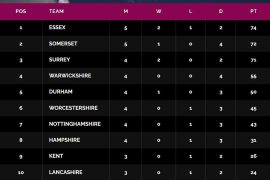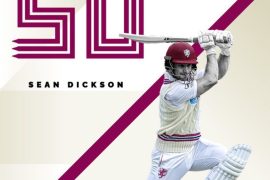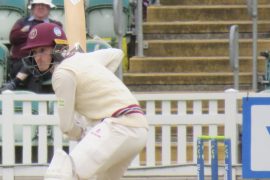
Somerset v Kent, Gillette Cup Quarter-Final, Taunton, 8th August 1979 – Somerset 180 (Burgess 50*, Richards 44) beat Kent 60 (Garner 5-11, Botham 3-15)
I have tried, I really have, to find a game that surpasses this in all my years of watching Somerset. But continuing this week’s underlying theme of celebrating the history and memories that supporting Somerset has given us this game stands out. This is our county and, like the loyalists of the other seventeen, it is only our club embedded in our county with its traditions and past that can give us memories and emotions like this.
This was a day that started early, thirty minutes before the gates opened the queues were around the ground as Somerset supporters’ attention turned once more to the quest to win a trophy. Our club, who were described as “the team to watch” at the time and regularly referred to as everyone’s second favourite team had tarnished their reputation as a result of the 1 ball declaration at Worcester in the Benson & Hedges Cup earlier in the year. There was still a sense of a siege mentality as we made our way into the ground that Wednesday morning. As soon as we were let into the ground the atmosphere was intense, the game was a sell-out. Somerset expected.
The disappointment of the final defeat to Sussex in 1978 carried right through the following winter. Almost exactly 11 months after that Lord’s defeat Somerset had progressed to the quarter-final and were drawn at home to a Kent side that was, at the time, packed with cricketing royalty. Somerset had comfortably beaten Derbyshire in the previous round by 8 wickets with 4 overs to spare while Kent squeezed home at Canterbury against Lancashire by 18 runs.
But hopes were high. This was still the Somerset side that contained world superstars, surrounded by a fantastic supporting cast of outstanding often unsung county cricketers. One of those was Graham Burgess, who may not be remembered for the defining contribution he made to this game without which there would have been no trip back to Lord’s for Somerset in 1979.
From the start this was a game that plunged us to the emotional depths before a glorious resurrection. Remember that the Gillette Cup had become all-consuming for many Somerset supporters (me included) in the late seventies. Somerset were there or thereabouts in the Championship during this period but the opportunity for that first ever trophy first came in the 60-over knock out competition.
Brian Rose won the toss and elected to bat. While my memory is somewhat hazy, I think I am right in recalling that the early morning brightness turned overcast at around the time the toss took place. Whatever, Rose must have been confident in the surface and overhead conditions to bat first.
Within an hour the Somerset innings, and hopes of a first ever trophy, were in tatters. The score had not reached 50 and Somerset were four down when Peter Denning was caught at slip by Chris Tavare off the medium place mediocrity of Bob Woolmer. Rose, Slocombe and Roebuck having already been dismissed
All hope was however not lost. Ian Botham joined Viv Richards with plenty of overs in hand there was still the possibility of a respectable total to defend and the hope that these two could do something special. Initially all went well but after adding exactly 50 the partnership was broken and 95-5 quickly became 110-7 with Viv Richards also gone caught behind off Woolmer for 44.
Graham Burgess had joined Viv when Botham departed and watched as his partners at the other end perished. But Burgess was not a man to be fazed by even such a dire situation as 126-8.
Burgess was what many would describe as a journeyman county cricketer. That’s a description often misunderstood as disparaging but in Burgess’ case it was entirely apt. He was a solid county player, never going to set games alight or come close to England recognition but a loyal servant to his home county who was always willing to do the hard yards.
Burgess, born in Glastonbury and nicknamed Budgie because his gentle run up which contained an apparent pecking movement with his head. He made his debut for Somerset in a Second XI fixture against Cornwall when he was fourteen, was taken on by Somerset as a member of the junior ground staff in 1965 and made his first-class debut the following year. Colin Atkinson would recall being joined at the crease by a diffident Budgie who, noticing that Wes Hall – famed for his pace and for a long, rhythmic and intimidating run-up – had been brought back into the attack, ambled up to Colin and pleaded: ‘Skipper, I’ve never faced him before. Will you take him?’ Colin Atkinson cited this as an example of a lack of confidence that held Graham back in his early years.
There was a sense among most commentators that he never fulfilled his rich potential not because of any lack of commitment to the cause but because he was just simply too rounded a man – in every sense.
And yet, no one should ever doubt that he cared passionately about the fortunes of his beloved Somerset. He sank to his knees in despair in 1976 when on the last ball of the last fixture of the season in the John Player League, he failed by one run to steer his side to the first trophy in their history.
Now it seems likely that those feelings from Cardiff were still etched in the mind of Glastonbury’s finest three years later as he stood at the other end as Joel Garner, Somerset’s number 10, marched to the crease.
Somehow, Burgess, Garner and then Keith Jennings added 64 crucial runs. Garner’s contribution was 12 as the ninth wicket added 31 Jennings 7 out of 33, taking the Somerset innings into the sixtieth over.
They say momentum is a big thing in sport. This was certainly a factor here as Kent, who must have anticipated a worst-case chase of 150 must have been slightly unnerved by those additional 40 runs. There was one man in the ground though who was certain this wasn’t enough. Dad. To say, God bless him, that he was at the pessimistic end of the scale with all things Somerset would be generous. If Viv was on 150, going like a train and only 20 were needed in 30 overs with nine wickets in hand he would still be a bundle of nerves.
I can’t recall the exact words but I’m guessing our interval conversation went something like this. Dad, “well that’s still nowhere near enough against this Kent side”. Me “but we have Garner and Botham”. Dad, “yes but they can only bowl 24 overs and that still gives Kent plenty of time, we needed 270 or more to have a chance” …. It would have been a long ten minutes between innings!
Thankfully that discussion would have ended as Brian Rose led his side out from the then brand-new Colin Atkinson Pavilion. This was a moment that I recall vividly. The sight of my heroes followed by the Kent openers Woolmer and Johnson gave me renewed belief. The crowd in the County Ground that day seemed to sense they had a big part to play and by the time Garner and Botham were marking out their runs the atmosphere in the ground was like nothing I had ever witnessed before.
Graham Johnson had already upset the faithful in the River Stand earlier in the day while fielding at third man, clearly mocking as the Somerset top-order folded. His obvious smugness as the Somerset innings collapsed did not endear himself to the locals who gave him plenty of “verbal banter” back. Strangely I also remember he was wearing a black leather necklace, clearly visible under his Kent shirt. It was the source of much amusement to the packed crowd behind him. Funny how these random insignificant things stick in your brain
But now charged with the dubious pleasure of seeing off the opening spells of Garner and Botham and setting Kent’s run chase off to a solid start, the boot was well and truly on the other foot.
It was a task he and his colleagues failed, spectacularly, to achieve.
Botham was we all know a superb cricketer, but his bowling was rarely what could be described as quick. This though was one of those occasions, when, bowling in tandem with Garner, he was searingly quick.
Woolmer was caught at second slip by Botham off Garner for 6. Johnson was bowled for 1, 14-2. Suffice to say Johnson’s smugness had disappeared as he looked back at his wrecked stumps!
If Botham was quick that day Garner was fearsome in this spell. Derek Taylor seemed to be standing more than half-way back to the boundary and even Ian Botham was an unusually respectful distance at second slip. The broad grin on Botham’s face as ball after ball whistled at unplayable pace and height past the hapless Kent batsmen was clear to see even at the distance back in the River Stand. The thing about Garner at this time in his career was that he was still one of the supporting cast of West Indian quicks and could seem from his effortless ambling run up to be as gentle on the field as off. But in that last moment before delivery when he gathered himself, rose to his full height and brought his right arm in a high arc the full horror of what was about to happen became clear to the batsman. His extraordinary height at delivery allowed him to bowl a length that was almost impossible to score off often impossible to defend either. He was always very economical, often completely unplayable but in this innings he was as frightening as I’d ever seen.
14-2 soon became 19-4 as Tavare and Ealham were also dismissed for ducks. John Shepherd joined Asif Iqbal and they managed to add 21. Kent were still well short of their target but there was to be no recovery here today. The faithful Jennings, who had been brought on second change, removing Shepherd for 9.
From 40-5 the end was swift. Clinically brutal and swift. Botham removed Asif for 10 and while Chris Cowdrey was on his way to a top score of 12 the rest could not stay with him. Fittingly it was Burgess who removed “Cow” and with the Garner and Botham returning to remove the tail (for 6,0 and 0) Kent were hustled out in 28.4 overs for 60.
Several years later I was at a sportsman’s dinner and asked Cowdrey if he remembered that day. From the reaction to the question it was clear he did but didn’t want to. He did however concede that the combination of crowd and bowling, united in their hostility, was something he rarely experienced in his career
Garner finished with a man of the match 5-11 in 9.4 overs, Botham 3-15 in 10. It is easy in hindsight to dismiss Burgess’ contribution, which began with Somerset 95-5 as irrelevant given that Garner and Botham bowled Kent all out for 60. But that is to miss the point. I firmly believe that without that swing in momentum Kent would have chased down the smaller target. And Somerset history would not be written as it is.
Graham Burgess probably didn’t mind missing out on the awards and limelight. He was never one for all that self-promotion and hoopla and would have been much happier celebrating in the dressing room with his teammates content with a job well done.
One final thought. Perhaps it was a degree of sentiment as well as gratitude, as well as Graham’s steadying influence, that led captain Brian Rose to include him in the eleven who won their first Lord’s final in 1979.
With thanks to Stephen Hill and Barry Phillips for the use of sections of Graham Burgess’ player profile in Somerset Cricketers 1946-1970 and additionally to Stephen and Barry, The Somerset Cricket Museum for the image of Burgess













